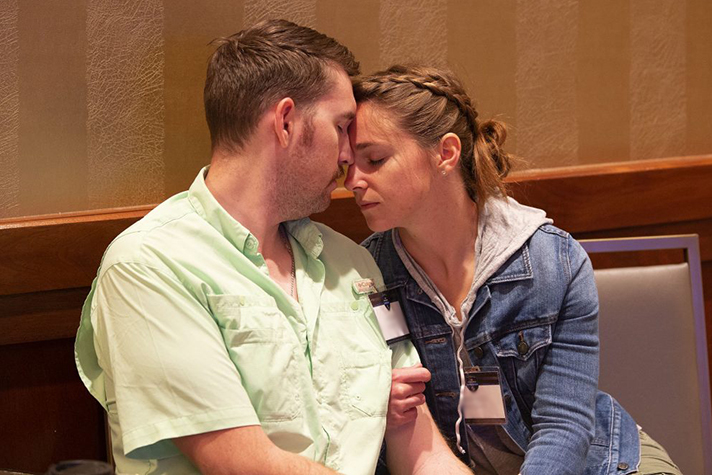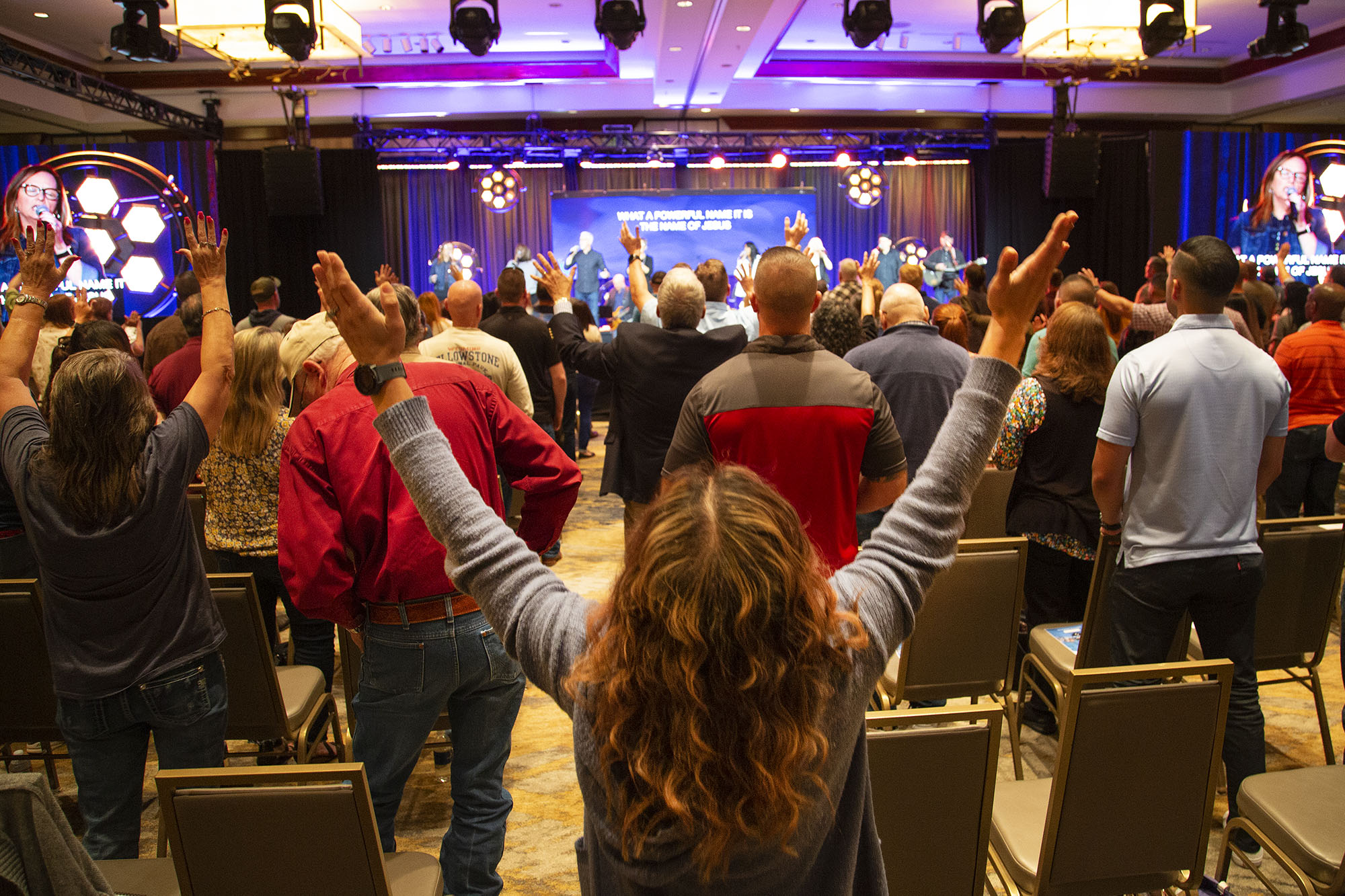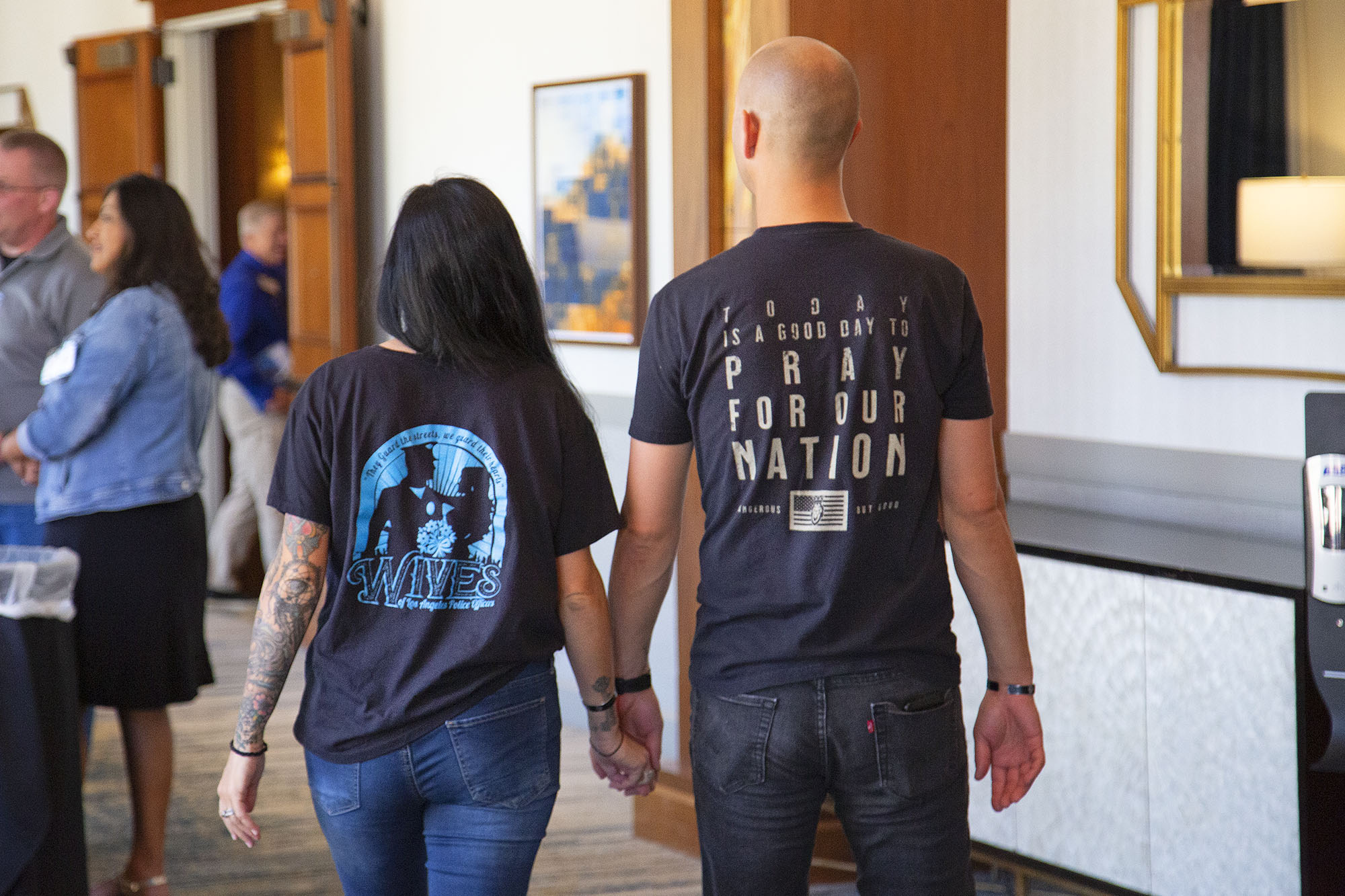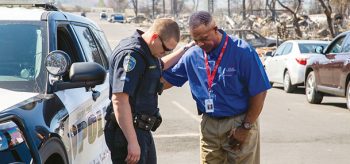
At this spring’s Law Enforcement Appreciation Retreat in Horseshoe Bay, Texas, the Billy Graham Evangelistic Association talked with officers’ spouses who’ve felt the highs and lows of law enforcement, especially in the past year amid a pandemic and anti-policism.
Sitting around an outdoor table between conference sessions, four women—Amanda, Emily, Noel* and Amy—candidly discussed what it’s like to do life together as they raise children and support their husbands in the line of duty. Three of the wives live on the same cul-de-sac, while their husbands serve together at a local police department in Southern California.
The free, three-day retreat gave them a chance to reflect and be renewed, especially after facing riots in recent months. Through tears and laughter, the wives spoke openly about their home life.
Q: What’s been a challenging part of the past year as a law enforcement wife?
Amanda: It’s all over social media and all over the news, anti-cop rhetoric, but the hardest part over the last year has been the people we have grown up with and been closest to, just seeing their perspective or the things they’ve thought now come out, and feeling like we’re alone. Even the people we thought had our backs, just feeling like nobody understands, nobody really gets it.
Q: How has your role as parents changed due to your husband being a law enforcement officer?
Emily: You have to learn to be independent because … they’re not going to be home for dinner every time. They’re not home for bedtime—we all have kids. So, you’re single parenting sometimes and you have to be OK with that, or else you’re going to get really upset. It’s not about keeping score of who’s done more than the other in the parenting role.
I had to learn how to manage my expectations, which is that I can’t have expectations. My expectation has to be this is how it works out if they’re tired, if he has to work overtime. I’ve learned to be flexible.
Noel: You also have to be OK with the flip side of being totally independent—and then you have the transition time of when they’re back for a few days. It’s always a little transition of OK, it’s not all my rules, my decisions. [You’re] having to parent together then.
Q: How has your faith helped you pull through being in law enforcement?
Emily: For me, it’s 100 percent. I guess the hope isn’t just that nothing bad happens. I know that I have hope in God … no matter what circumstances I find myself in, whether good or bad. I truly don’t know how people cope well without faith in God, who’s sovereign over any circumstance, because then [their] faith is in their situation.
Q: Were there riots where you live in California?
Noel: Yeah, really bad. It was horrible. It makes me get teary. That was a tough stage. We had just gone through the initial lockdown of a few months.
And then the riots hit. [Our husbands] were working with very little sleep. I remember being scared for my husband to even walk from his building to the car because that was where all the riots and protests were. [Emily’s husband] was in the thick of it. And not knowing where they were being stationed each day or when they’ll come home. That was the lowest that I’ve been through in the 14, 15 years [of law enforcement].
Q: How did—or did anyone—support you during the riots?
Noel: We had people. While everybody has appeared to hate the police, there were certain people that started texting that I hadn’t heard from in years, that would check in. … ‘Hey, we’re praying for you guys.’
One of our pastors reached out to each police officer and even texted or messaged them.
Amanda: My second grader’s teacher drove an hour and a half and surprised us at our doorstep with meals and toilet paper. He just wanted to do something for us and show us love because he knew that our husbands’ jobs were under attack and the world was against us.
Q: What are the lasting effects of the riots?
Emily: I just feel like it could happen again at any moment, like with the next officer-involved shooting. They’re being told [the riots are] an expected response.
Noel: It used to be looked down on when you hear the rioting going on and [now] the news media is saying, ‘This is what [officers] get’—the way they’re treating them.
Emily: Watching [people] break into Target and a University of Southern California professor saying, ‘This is good, they’re getting what they deserve now.’ I was getting very hopeless with that side.
Amanda: Before we worried about our husbands getting involved in a use of force. Now, it’s more than that. It’s what are going to be the repercussions of that? I want my husband to protect himself. I want him to have to do what he has to do to come home.
Amy: Laws are changing, too, that are making their jobs more difficult. It’s frustrating on their end to feel like they’re doing a good job when a lot of laws are changing that don’t support their role and how they support the community. It is kind of like, what am I doing? Why am I doing this if the community and politics come against me?
Q: Have you talked with your children about the riots?
Noel: I’ve actually had to have conversations with our kids this year, where we’ve never really [before]. Dad, a cop, is always kind of a hero. But this year, they learned, oh, actually some people greatly dislike your dad.
Q: How has the retreat encouraged you?
Amanda: Just to be somewhere that’s focused on marriage for law enforcement … where you hear people appreciate what our husbands do and want to provide us with a moment to recharge. I’ve just been like, ‘Yes, yes!’ listening, and so happy to hear people respect and appreciate the situation and know that it’s hard on families—and want to provide us with this experience.
Noel: Just the acknowledgement that we need support and help, and [officers] need support and help. You’re not forgotten and you’re not being looked at like the rest of the world is looking at [law enforcement].
Seeing … the world turn, and even friends, family and churches, has been super discouraging. To come here and feel safe, that you’re surrounded by cops and you can talk, … and just a reminder like [conference leaders] said last night, people have sought out to provide this opportunity and pay for it.
>>Give to Law Enforcement Appreciation Retreats
Because it sounds like the world hates all of [law enforcement], and that’s not the reality. … To restart, and remember there’s so many good guys out there … there’s so many working really hard and trying to do a good job.

Q: What do you say to younger law enforcement couples who are having trouble in their marriages?
Noel: Encouraging the time and place for your husband and for you to be in the Word. We’ve always signed up to a Bible study that’s pretty hardcore because I realize I have no discipline on my own—marriage and kids and everything takes over.
And, connect with other believers that are wives and families. [Those are people who] understand what you’ve been through the last four days with sleepless nights and no husband. It’s nice to be with believers and have those shared experiences.
Q: Do you have anything else to say in regard to this retreat?
Amanda: Just thank you, like really. This is my first time coming and I can’t wait for the next one. To know that there’s a big organization that’s respected and not crumbling to the world’s views, and that has a pulse and wants to specifically meet [struggling cities’ needs].
Emily: It’s really nice to come here and feel supported, and have an international organization share they’re here to support us because [our husbands] don’t get that from their workplace, really.
Amanda: We saw the refund [for the retreat], and we thought it got canceled because of COVID. We were like, ‘Oh no, it got canceled.’ Then we saw the email [that it was paid for by donors] and it just touched us.
Noel: They don’t really wanna buy the cops coffee much anymore, all those things that used to be, so for somebody to be like—here’s a trip, go get blessed.
*Name changed to protect privacy.



